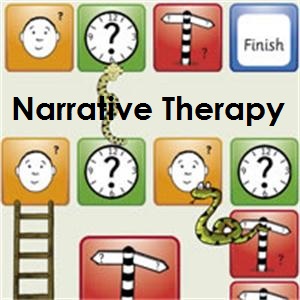What is narrative therapy?
When we talk about ‘narrative’, we are referring to the ability to tell a story or series of events with precision and clarity. For younger children this will happen verbally, but it also transfers to written work for older children. This is a very complex skill that requires remembering what happened, getting all the parts in the correct order, picking out the key information, finding and using the correct words in sentences and remembering grammar rules!
Why is it important?
We expect children to use narrative skills everyday. Remember it doesn’t just mean telling a story. When you ask your child what they did at school that day or when a teacher asks a child to explain what happened on the playground – these require good narrative ability. As children get older and have to logically order their work, make arguments, use paragraphs – these all require narrative skills.
We also see a knock-on impact on children’s literacy skills. They may have difficulty decoding and understanding the meaning of text. They may find it hard to make inferences and predict what is going to happen. In their written work they may have difficulties using more complex grammar and conveying their ideas.
How to spot a narrative difficulty.
Children with narrative difficulties tend to show some of these types of difficulties in their narrative retelling:-
- They use short sentences with less detail.
- Tend to talk about things in the here and now rather than extending this to other situations and times.
- Events in their narratives do not logically link.
- The story does not flow logically from one element to the next and they may jump around within the story.
- There may be mistakes or contradictions in the narrative.
- They may have a reduced vocabulary and use general words such as got, things and do.
- Difficulties knowing where to start. The child may jump straight in without giving the listener enough information and setting the scene.
What can you do to help?
There are different approaches to narrative therapy, but the most well known in the UK is the series of resources produced by Black Sheep Press. They provide a well structured, pre-written programme for teaching question words and narrative skills. They use colour and visual support to aid learning of the key elements and teach children how to move from the individual story elements onto producing their own narratives.
- Nursery Narrative pack – This is for children aged 3-5 years and introduces the narrative structure of ‘who’, ‘where’, ‘when’ and ‘what happened’.
- Reception Narrative pack – This is for children around the ages of 4-6 years old and extends on the nursery pack and links learning to literacy.
- Speaking and Listening thro narrative – This is for children in Key Stage 1 (5-7 year olds). The latest edition provides full colour resources and lessons plans to support all narrative elements and link to the curriculum.
- From Oral to Written Narrative – This is designed for children in Key Stage 2 (7-11 year olds). Again all resources are in colour and at each stage learning is linked to written skills and the curriculum.
- Black Sheep Press also have some other supporting narrative packs and assessments – why not go and have a look! Fun with narrative is another of my favourites. You can also read our reviews of their narrative assessment apps here.
Hopefully now you know a bit more about narrative and why Speech Therapists talk about it so much! Helen and I have written further posts about the different areas and how to support them – you can find these by clicking on the links below.
Narrative therapy – what happened?
Narrative therapy – emotions and dialogue
Narrative therapy – the whole story!







Leave a Reply